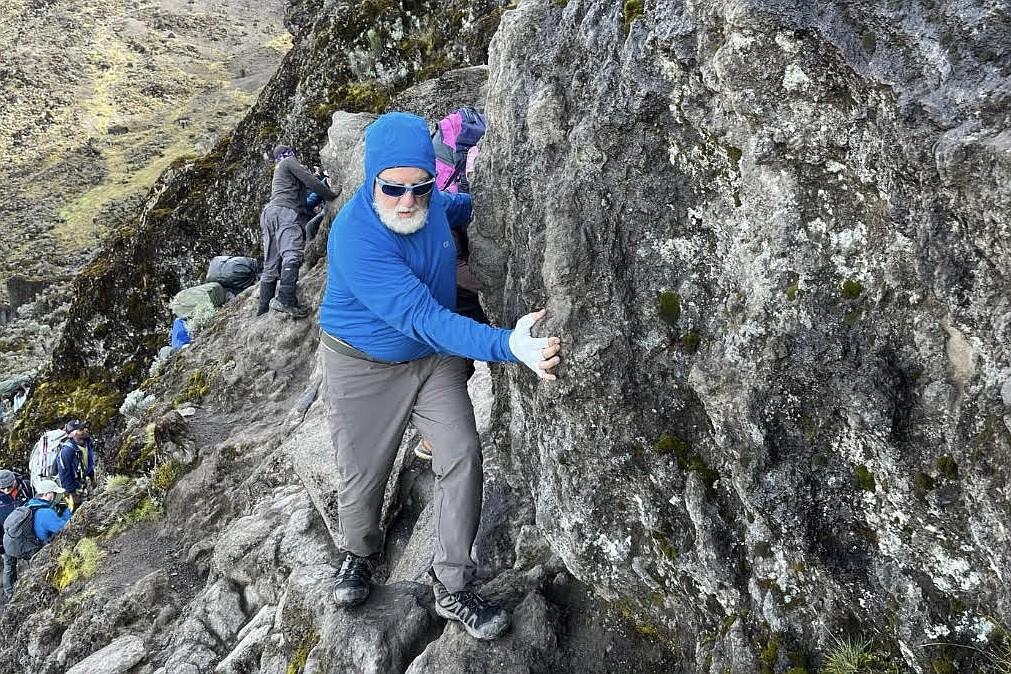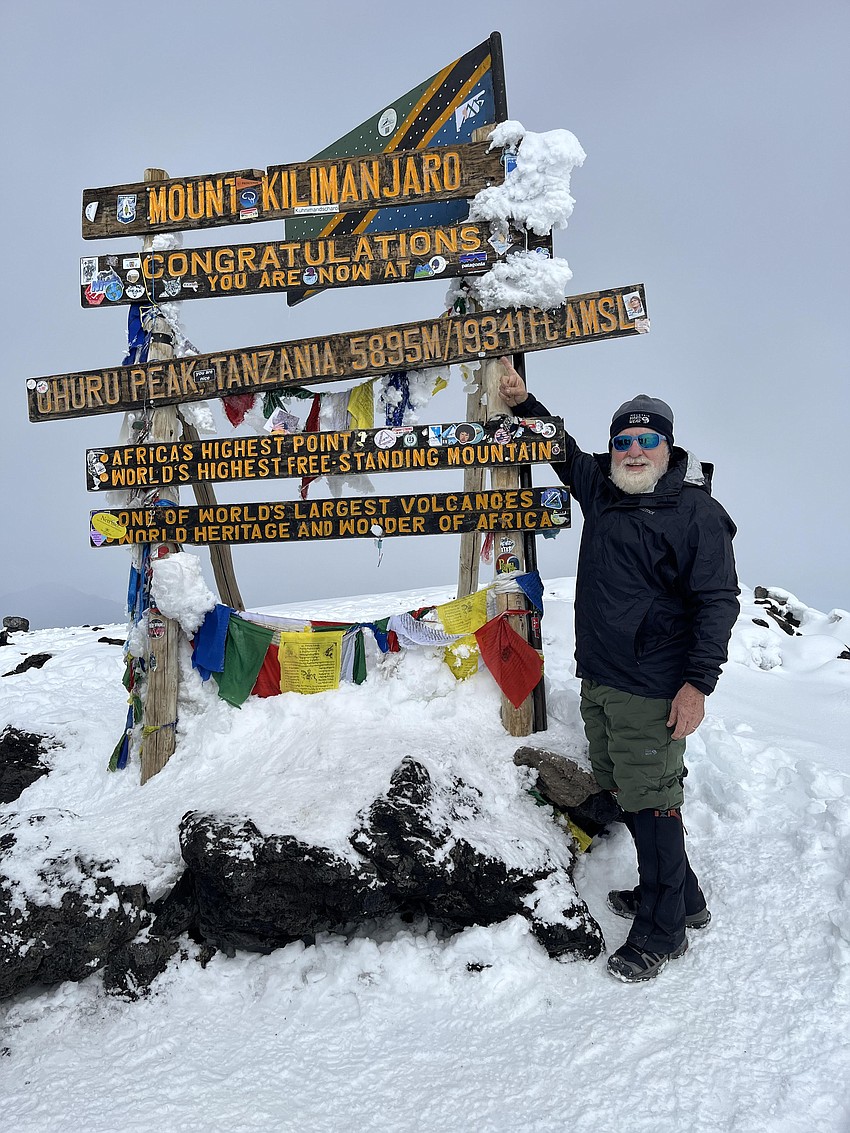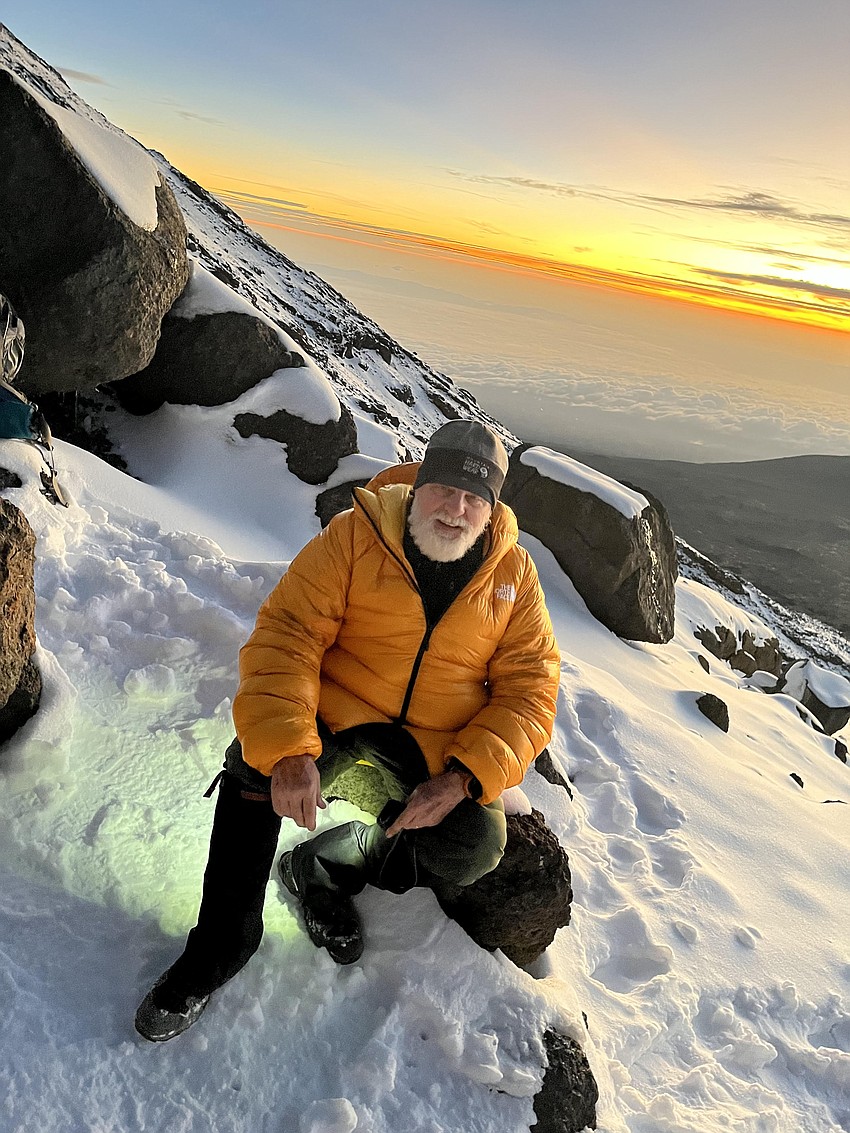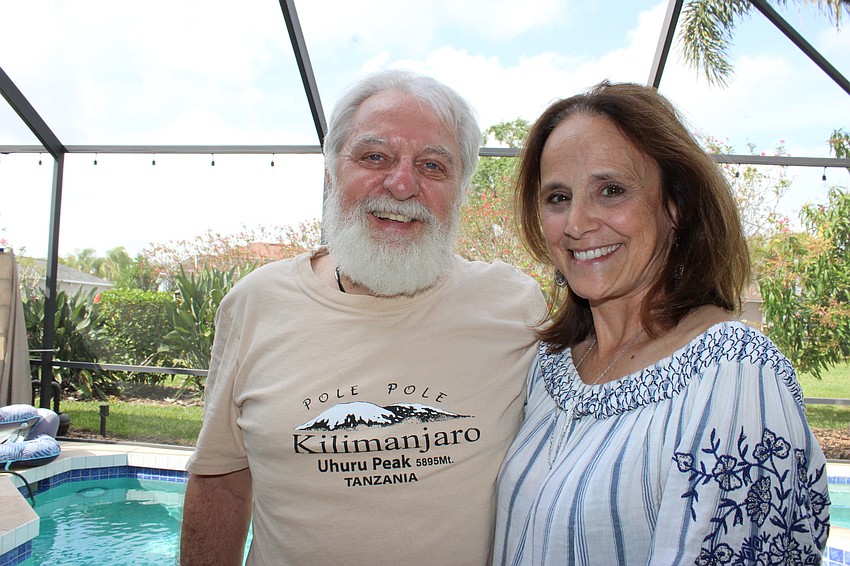- January 16, 2025
-
-
Loading

Loading

David Paliotta was re-creating the fateful steps in his Summerfield home.
It was a laborious effort, his right leg taking a robot like step upward and forward, then dropping heavily to his living room floor.
Then pole, pole — pronounced po-lay po-lay — his left leg followed, moving forward barely a foot, then dropping like a wet bag of cement.
Boom! A smile peaked through his heavy, white beard.
On Feb. 29, Paliotta had reached the summit of Mount Kilimanjaro in Tanzania and on a sunny Florida day he wanted to show just how hard those final steps were to complete.
"Pole, pole" means "slowly, slowly" in Swahili. It was a constant reminder during his ascent of Kilimanjaro.
Those final steps to reach the 19,341-foot marker might have seemed lighting fast to Paliotta considering he started his trip five years earlier.
The first step of his journey came in 2019 when his daughter, Emma Paliotta, insisted on a hiking trip to Angels Landing in Utah. Emma Paliotta figured it would be both a confidence-building trip while wrapping up some unfinished business at the same time.
David Paliotta was afraid of heights, and Angels Landing — as described by BackPacker.com — "is a 1,488-foot tall rock formation in Zion National Park that requires the hiker to need mental and emotional fortitude to hike the half mile of narrow, precarious pathways over deep canyons."

"I never had been hiking, but I am proud, so I persevered," said Paliotta, who had moved to Lakewood Ranch in 2015 after retiring at 62. "I had to stop every couple of hundred yards, and I thought it was because I was out of shape."
When Paliotta returned to Florida, he ignored the pressure he had felt on his chest. It almost was a fatal mistake.
In June 2021, Paliotta was taking the next major step in his journey to the top of Kilimanjaro. He just didn't know it yet.
He was getting on a step ladder at his job at Sarasota Glass and Mirror. He was out of breath and he thought he was having a severe case of indigestion.
His wife, Maria, who works for Tidewell Hospice, wasn't so sure. She told him he should go to the hospital, but he said he was fine. In September, he was feeling pain again, and Maria put her foot down.
"You're going to the hospital," she said, showing the firmness in the tone she used that day.
They went to Lakewood Ranch Medical Center, but they assessed him and sent him by ambulance to Sarasota Memorial Hospital. He was met at the door by Dr Jeffrey Sell, the chief of cardiovascular surgery. Paliotta knew he was in serious trouble.
Thinking back to that moment in the hospital, his eyes filled with tears and he had trouble talking.
"I told Dr. Sell, 'Try to save my life because I want to walk my daughter down the aisle."
"The next thing I remember is that I had tubes down my throat. They had to do a quadruple bypass. They took a vein out of my leg and built the bypass."
Maria Paliotta couldn't be at the hospital because of the pandemic, but she said the Sarasota Medical staff described everything that was happening over the phone.
"They couldn't have been kinder, more reassuring," she said. "Dr. Sell is amazing. He kept saying, 'You're husband will be OK.'"
She was able to download an app that allowed her to watch the step-by-step progress of the surgery. She sat on her living room couch and never took her eyes off her computer screen.

"We were supposed to go on vacation," she said. "We were going off the coast of Venezuela. He would have died. We wouldn't have had the availability of incredible medical care."
Back at home, Paliotta was determined to get into shape. Maria said they went to one cardiologist who told them he had about seven months to live. Then they found cardiologist Garrett Brown, a mountain climber who told Paliotta it was his job to get him to climb to the summit of Kilimanjaro.
"That's why I chose him," Paliotta said.
By summer 2022, Paliotta went to his homeland of Wales to climb Yr Wyddf, the highest mountain in that country at 3,559 feet.
He graduated to other training climbs at Mount Chiquita and Ypsilon Mountain in Estes Park, Colorado.
Maria was concerned, but she knew he "has the heart of an athlete. I knew he had to prove this to himself."
At age 16 in 1969, Paliotta gave up a professional soccer contract with Burnley F.C. and moved from Wales to the U.S. to be with his dad. He later earned degrees in technical writing and information systems and engineering.
If he was going to take an extreme risk (according to the Kilimanjaro National Park website, 3 to 10 people die each year trying to climb Kilimanjaro) he was going to be smart about it. He hired Embark Exploration of Portland, Oregon, to lead him.
At age 70, he arrived at Londorossi Gate on Feb. 23 and went to the Mount Mkubwa camp at 9,100 feet. Over the next week, his group of 12 people, including four men in their 70s, hiked to the summit.

When he arrived, Paliotta wasn't filled with emotions as he thought he might be. He remembered the words of Maria when he came home from the hospital.
"God has great plans for you," she said.
He began taking in the sights, telling himself that all the suffering was worth it. He thought about the days he wore a backpack with 20 pounds in it, then walked up and down the flights of stairs at the Nathan Benderson Park finish tower. Then there were the days of training with his personal fitness trainer at L.A. Fitness.
"I needed this mountain," he thought.
Maria said he worked hard for his moment.
"He has changed his whole life, his diet, his nutrition," she said.
Paliotta hopes his story checks a couple of boxes. First, he wants people to know about the outstanding care he received at Sarasota Memorial.
"Dr. Sell is amazing and I was attended to by 15 to 20 nurses. Other staff helped me to walk when I didn't want to do anything. I will never forget them. They touched my soul."
Second, he hopes his story inspires others to do something they deem special.
"He has pushed me to do things," Maria said. "I have a bad knee, and I am a bone cancer survivor. We have inspired each other."
Oh, and he also suggests guys listen to their wives when they tell them to go to the hospital.
His story was just about told, but Paliotta was standing again. He remembered something else from his ascent.
"At 17,500 feet, I started singing The Lord's Prayer in cadence with my footsteps," he said while walking slowly forward. "I don't think I would have been alive without divine intervention."
He was imagining his final steps. Once again he saw the glacier, the mist, the clouds, the snow. The temperature was mild, about 15 degrees. There had been 100 mph winds two days before.
It was calm, and so was he. He knew the beginning steps of his journey, when his daughter took him to Utah, when his wife forced him to go to the hospital, had led to this moment of triumph. He was grateful, and proud.
"People express fear," he said. "But you can't stop living."